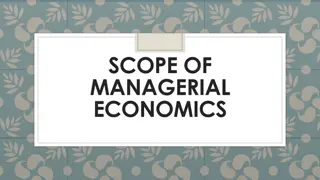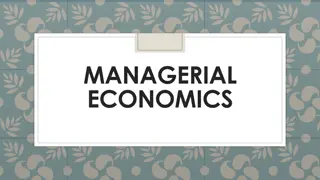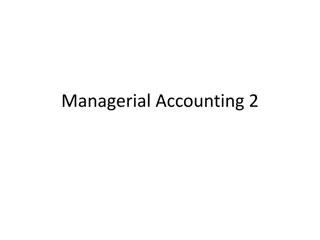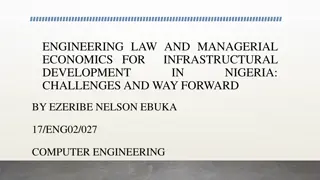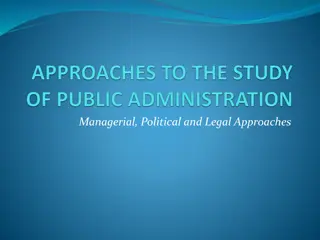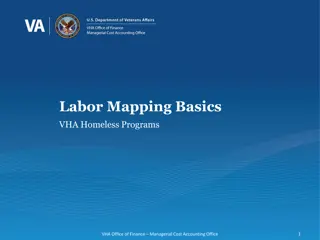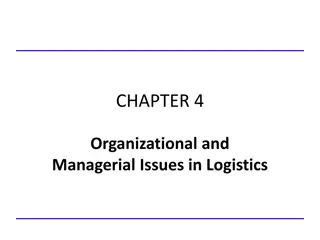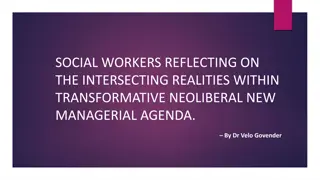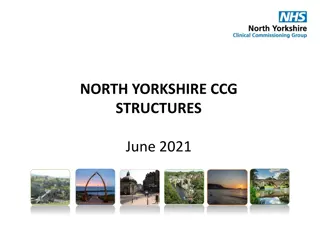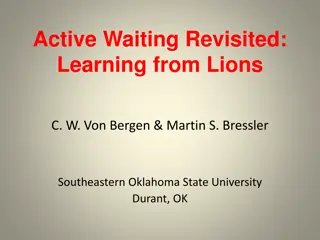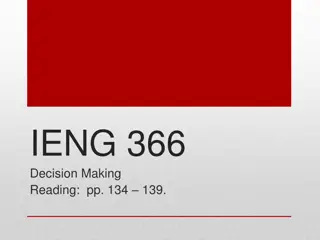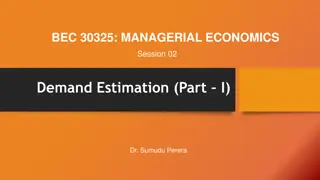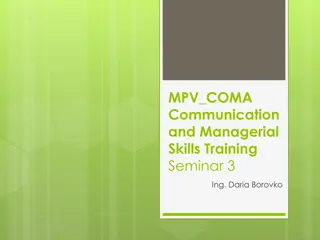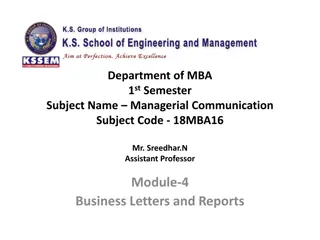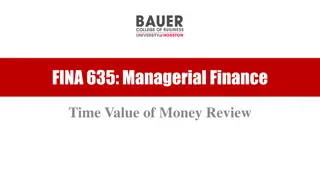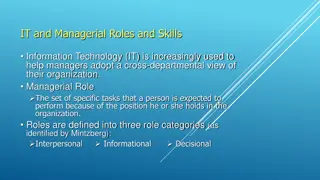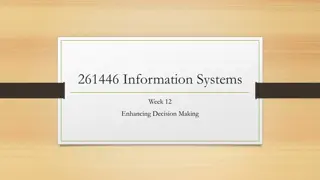Management and Managerial Roles
This content delves into the realms of management, focusing on managerial roles, skills, and the importance of managing resources effectively in a dynamic environment. It explores the art of getting things done through people and organizational resources, emphasizing efficiency, effectiveness, and the functions of management such as planning, organizing, leading, and controlling. The content provides insights into the key aspects of management and the strategic decision-making processes involved in achieving organizational goals.
Download Presentation

Please find below an Image/Link to download the presentation.
The content on the website is provided AS IS for your information and personal use only. It may not be sold, licensed, or shared on other websites without obtaining consent from the author.If you encounter any issues during the download, it is possible that the publisher has removed the file from their server.
You are allowed to download the files provided on this website for personal or commercial use, subject to the condition that they are used lawfully. All files are the property of their respective owners.
The content on the website is provided AS IS for your information and personal use only. It may not be sold, licensed, or shared on other websites without obtaining consent from the author.
E N D
Presentation Transcript
1 UNDERSTANDING MANAGEMENT AND MANAGERIAL ROLES Achala Dahal and Ashish Rai
Discussion Points 2 Understanding Management and Managerial issues in changing context Managerial Roles and skills Managing resources and priorities
Exercise 4 What comes in your mind when you think about management and managers? Please express in the form of picture or diagram in the flip chart. You have five minutes.
Management 5 Management is the art of getting things done effectively and efficiently through people using organizational resources - human, finance, material, method and information- in a dynamic environment.
6 Managerial Concerns Efficiency: Doing the things Right getting the most output for the least input Effectiveness: Doing the Right Things Attaining organizational goals
7 Management ensures that these resources are combined into a total system to accomplish an objective. It is a process of deciding: How many people are to be economically employed, What kinds of people to assign to what jobs, How much money to spend on specific problems, What kinds of activities to perform first and what to perform last, How much time should be spent on one activity, and Who are the customers and whether they are satisfied with its products and services.
Functions of Management 8 Planning Setting objectives Determining how they ll be met
Functions Organizing Delegating and coordinating tasks Allocating resources 9
Functions Leading Influencing employees to achieve objectives Guiding, supervising, coordinating, motivating, leading, and overseeing of employees 10
Functions Controlling Establishing mechanisms to make sure objectives are met Implementing mechanisms to make sure objectives are met 11
Who are managers ??? 12 Lets think and discuss
Who is Manager ? 13 People who manage other people and resources are called managers. A manager is a person who is responsible for running a particular section, or a business or an organization. Without his leadership the resources of production remain resources and never become production. A manager has: Targets to achieve, People to manage, Tasks to perform, An organisation to liaise with, and A distinct shortage of time. Basically, there are two types of managers: doer and developer .
What is a Role? 14 A role is a set of responsibilities organised (or behaviours used) to produce specific outputs related to a specific function/ position. a pattern of
Exercise: Managerial Roles 15 What you do as a manager (tasks / functions)? Individual Group
Managerial Roles 16 Managerial Roles by Robert Katz: Planning (As a Planner) Organizing (As an Organizer) Leading (As a Leader) Controlling (As a Controller) Mintzberg's Classification of Managerial Roles: Interpersonal Roles Informational Roles Decisional Roles
The Managerial Roles 17 Category Roles Figurehead Leader Liaison Provide Information Interpersonal Monitor Disseminator Spokesperson Process information Informational Feedback Entrepreneur Disturbance Handler Resource Allocator Negotiator Decisional Use information
A. Interpersonal Roles 18 Figurehead role. The manager performs ceremonial and symbolic duties by virtue of his position, e.g. receiving dignitaries, attending parties, visiting the sick employees, etc. Leadership role. As heads of units or departments managers are responsible for the work of people in that unit. As a leader he gives directions, appraises performance, correct mistakes, disciplines staff, motivates subordinates, determines rewards and punishments, etc. 3. Liaison role. The manager ensures contacts with other units and outside agencies on behalf of own unit. He works more as a public relations officer. 1. 2.
B. Informational Roles 19 4. Monitor. As a monitor of information, the manager scans his environment for information. 5. Disseminator. After having acquired information, the manager also passes this information relatively to his subordinates, superiors and colleagues. 6. Spokesman role. The manager represents his unit and its problems in different forums. As a spokesman, the manager presents the problem of his unit to others, and presents information to others who control his unit and so on.
C. Decisional Roles 20 7. Entrepreneurial role. The manager seeks to respond to the changing conditions of environment. He is constantly looking for new ideas and initiating development projects. 8. Disturbance handler. He responds to pressures and crisis situations. 9. Resource allocator. This role involves the allocation of resources: human, physical, financial and other forms of resources to get things done. Allocation of his own time and powers are important dimension 10. Negotiator. The manager is carrying on negotiations with external as well as internal agents.
Individual exercise 21 Score yourselves form 1 - Very Good, 2 Good, 3 Average Category Interpersonal Figurehead Leader Liaison Informational Monitor Disseminator Spokesperson Decisional Entrepreneur Disturbance Handler Resource Allocator Negotiator
Ways to improve ability in each role 22 Interpersonal Roles Ways to improve Start with your image, behavior, reputation Cultivate humility, empathy Learn how to set a good example at work Think about how to be a good role model First ask yourself how good are your leadership skills? Learn how to be an authentic leader, so your team will respect you. Improve your emotional intelligence Work on your professional networking techniques Use positive language 1. Figurehead 2. Leader 3. Liaison
23 Informational Roles 4. Monitor Ways to improve Learn to gather information effectively Overcome information overload Use effective reading strategies Learn how to keep up to date with industry news Learn how to share organizational information with team briefings Focus on improving your writing skills Communication skills Know the way to represent your organization at a conference Go through delivering great presentations Work with medias 5.Disseminator 6.Spokesperson
24 Decisional Roles 7.Entrepreneur Ways to improve Build on change management skills Learn what not to do when implementing change in your organization Work on your problem solving and creativity skills Excel at conflict resolution Know how to handle team conflict Manage emotion in your team 8.Disturbance Handler 9.Resource Allocator Learn to manage a budget, cut costs Use different analytical methods VRIO ANALYSIS Learn WIN-WIN negotiation skill Learn role playing 10. Negotiator
Level of Managers 25 First Line Managers or Lower Level Manager Supervise the individuals who are directly responsible for producing the organization product or delivering its service Responsible for implementation of plan and strategy prepared by middle level management Responsible for completion of work Sales Officer, Accounts Officer, Production Supervisor
Middle Level Manager 26 Top level manager delegates authorities and responsibilities to this level manager Gives instruction to lower level management and reports the task completed to top level manager Supervises staff department or first-line managers Marketing Managers, Department Head
Top Level Manager 27 Provides strategic decision for the organization Responsible for overall performance of the entire organization Chairman, General Manager, Executives, Directors, Senior Officers, Secretary
A Thought 28
Managerial Skills 29 50% 10% 40% 30% 45% 25% 50% 10% 40% - Robert Katz
What Resources does a Manager use? Human Resources-the people. Your most valuable resource! Financial Resources-the money, the budget Physical Resources-the buildings, the equipment, supplies Information-computers, reports 30
Managerial Roles The things we fear most in organizations fluctuations, disturbances, imbalances are the primary sources of creativity. Margaret J. Wheatley
Managerial issues in the changing context 32 Transformational leadership Cultural Diversity Social Responsiveness Ethical and Moral Obligations Technology .
Dealing with issues . 33 Derive a common loyalties Achieve Equity Be a Integrity Builder Training and Development
A thought.. 34 Thank You Any Queries?


